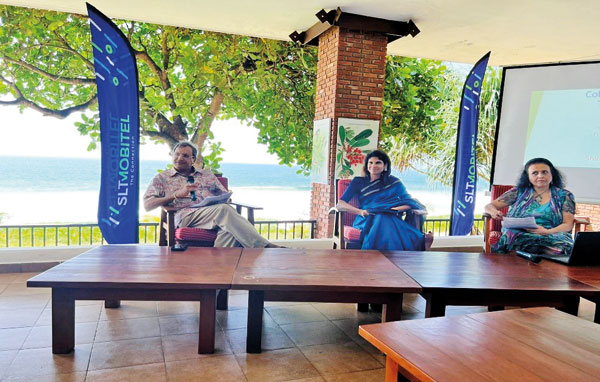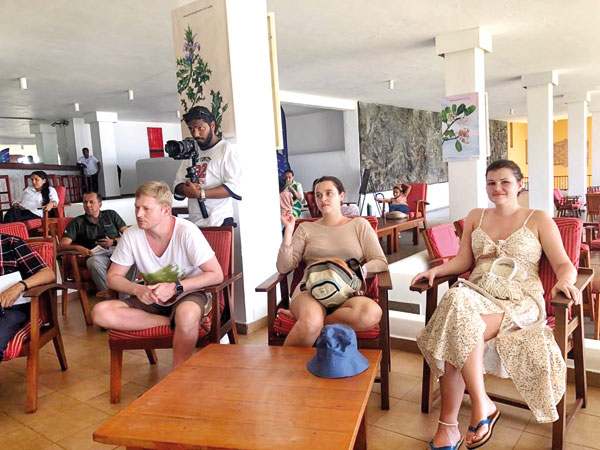Sunday Times 2
‘Sri Lanka as a destination: From antiquity to modernity’ discussion
View(s):The Lakshman Kadirgamar Institute (LKI) hosted a panel discussion ‘Sri Lanka as a Destination: From Antiquity to Modernity’ as part of its outreach activities to promote ‘Cultural Diplomacy’ in Koggala on Saturday (13).
Held with the Indian Ocean as the backdrop at the Long Beach Hotel, Koggala, the discussion was organised as part of ‘Rhythms of Paradise’ – the cultural spectacle of ‘Galle Concerto 2024’, with the aim of promoting the Southern coastline of Sri Lanka as a tourist destination. The three-week ‘Galle Concerto 2024’ commenced with an opening ceremony at the Air Force Base in Koggala, and a series of events which included literary explorations, interactive interludes, a drum festival and a musical concert.

Opening the session on ‘Sri Lanka as a Destination: From Antiquity to Modernity’ Ambassador Ravinatha Aryasinha said the event underscored the pivotal role of ‘cultural diplomacy’ in positioning Sri Lanka globally. He said it was a force which transcends borders and fosters mutual understanding. He recalled the writings of Ambassador Dr Vernon L B Mendis where it was observed “Few countries in the world could claim to have been so well known throughout its history as Sri Lanka. From earliest, it has enjoyed an international reputation and been admired”. Within the historical frame outlined – from antiquity to modernity, he said the discussion sought to capture the vibrancy and resilience on the one hand, and the unease and restlessness on the other, as Sri Lanka today seeks to carve out a modern day narrative on Sri Lanka – increasingly written by Lankan writers, many living in the diaspora, which presents both a challenge and opportunity.
Professor Asanga Tilakaratne, Emeritus Professor of Pali and Buddhist Studies, University of Colombo, who participated in the discussion virtually, painted a vivid picture of ancient Serendib from the Roman times, and how the island nation emerged as a significant entity in world history. He highlighted writings on relations with India, South East Asia and East Asia in which Sri Lanka was the destination – commencing with the Ramayana. He noted Fa Hsien being the first known Chinese Buddhist pilgrim.
Sri Lankan author and novelist Ameena Hussein, who also participated in the discussion virtually, highlighted the documented history of the island by Arab travellers and took the audience on a historical journey with her discourse centred on her recent book ‘Visitors from the Arab World: Ibn Battuta in Sri Lanka’. She expounded upon his role, emphasising the pivotal contribution he made to the historical chronicles of Sri Lanka.

Professor Shihan de Silva Jayasuriya commenced the discussion with a focus on ancient Ceylon during the Colonial era, she illuminated how Sri Lanka assimilated cultural elements influenced by the Portuguese, Dutch, and British colonial powers, shaping its distinctive identity. She delved into the impact of political, administrative, and legal reforms introduced by them shaping the fabric of Sri Lankan governance. She highlighted the contributions of diverse ethnic minorities, including the Malay community, Indian Tamils, and the Sri Lankan-Afro community, which have enriched the cultural tapestry of Sri Lanka.
Professor Ruvani Ranasinha, Professor of Global Literature, King’s College, University of London explored how Sri Lanka is portrayed in contemporary literature. She shed light on various modern authors’ perspectives which focused on themes such as the ethno-political crisis and representations of community, citizenship, minorities, national identity, and gendered social relations in Sri Lanka.
The presentations were followed by a dynamic exchange of ideas between the panelists and the audience which included tourists visiting Sri Lanka, scholars and university students. In his closing remarks, Ambassador Aryasinha emphasised the importance for a broader and deeper appreciation of Sri Lanka’s multifaceted identity, and the imperative of actively shaping Sri Lanka’s cultural narrative in the global arena in positioning Sri Lanka on the global map, in order to promote tourism.

